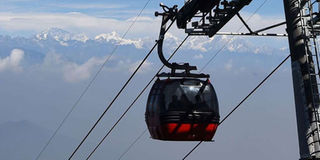French firm courts KCCA on cable cars

Cable cars could ease Kampala’s double mess of congestion and traffic mess. Courtesy photo
What you need to know:
- Since the beginning its mandate in 2012, KCCA has been promising to install cable cars by 2025.
GRENOBLE. Ropeway transport or cable cars could ease Kampala’s double mess of congestion and traffic mess, including shortening travel times around designated locations around the city, according to officials of a French engineering conglomerate, Pomo.
Pomo, with business in 80 countries around the world, manufactures elevators (lifts), aerial tramways, and cables cars.
The company’s Africa and Middle East sales manager, Mehdi Caillis, told Daily Monitor at the company’s assembling plant in the southeastern French Alps city of Grenoble, that “the key thing” to establishing cable car technology is neither planning nor topography but infrastructure.
“The other good thing about ropeway transport is that it does not conflict with other existing traffic systems since the route[s] is used exclusively by the cables cars and its infrastructure is suspended from the air,” he said.
Mr Caillis said in Kampala, with its topsy-turvy planning and expansive slummy neighbourhoods, once the decision to adopt ropeway transportation has been adopted, all it will take is to install the cable car infrastructure along the proposed corridors.
He argued that feasibility-wise, the cable cars would partly solve the city’s ground traffic problem. Other cities Poma has surveyed for cable cars as part of their sub-Saharan Africa expansion include Nairobi, Addis Ababa and Johannesburg, but Mr Caillis said they are already working in parts of North Africa.
He, however, admitted that cable cars work well in cities with organised mass rapid transit, a form of modern urban transport system that includes both road and light rail system. Kampala has none.
He also revealed that the company has had inconclusive “discussions” with the Kampala Capital City Authority (KCCA) and hopes they be revived soon.
He said if, for example, Kampala installed the three-cable technology which ferries 35 people in a cabin, it would replace at least 15 taxis.
Government effort
Since the beginning its mandate in 2012, KCCA has been promising to install cable cars by 2025. In 2014, Cabinet approved borrowing of $175m (Shs670b) from the World Bank for, among others, expanding the narrow city roads and embarking on cable cars to ease congestion in the city. Installation of cable cars was said would cost an estimated $3m (Shs11b).



